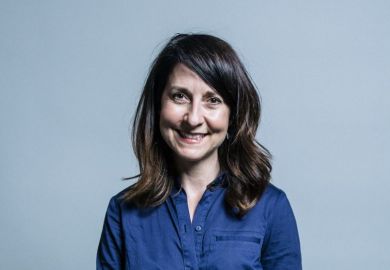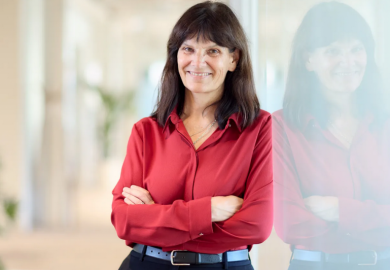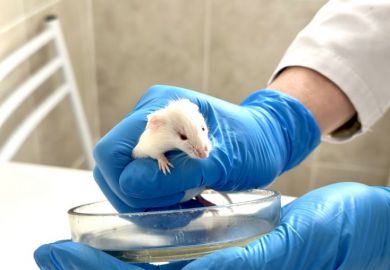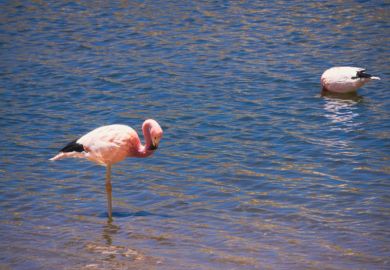When Peter Matthews went for coffee with the other fellows at Durham University's Institute of Advanced Study, he got chatting with a philosopher. Matthews's research focuses on decision-making during the early stages of product development, when the choice of whether to build a car with two doors or four, for example, constrains all further decisions. How can one model such a process?
The philosopher cogitated and made a suggestion. Had he thought about the difference between an Aristotelian and a Wittgensteinian approach? This is not the kind of conversation most of us have over coffee (and Matthews stresses that he and his colleagues sometimes talk about football as well). But it is the kind of conversation that the institute's diverse and highly distinguished group of fellows sometimes have, and Matthews found it a powerful stimulus to fresh thought.
Unlike the others in this term's team of ten, Matthews is based in Durham, as a lecturer in design informatics in the School of Engineering. Yet in the normal course of university life, there or elsewhere, it would have been all too easy never to have passed the time of day with a philosopher. Something strange and fruitful often happens when experts in distinct but related disciplines get a chance to talk to each other. But should these brief encounters be left to chance or consciously engineered? And what kind of institutions make them more likely to happen?
Few dispute that interdisciplinarity is often stimulating and valuable, if only because many important topics are located across or between traditional disciplinary silos. There is nothing particularly new about this. In the Renaissance, there were no firm divisions between the arts, sciences and philosophy, which facilitated social and intellectual contacts across barriers that have been erected only since. Much more recently, groups such as the Lunar Society of Birmingham in the 1760s united manufacturers and leading amateur experimenters in what would now be biology, chemistry, engineering and physics - men such as Erasmus Darwin, Joseph Priestley, James Watt and Josiah Wedgwood - to push back the frontiers of knowledge.
There are good reasons for thinking that we need similar initiatives today. Issues such as Aids and terrorism can be addressed only through a range of different interdisciplinary approaches. Some go further and wonder how much there is left to say on familiar themes while we stick to the old disciplinary-based questions. (This year is the 400th anniversary of Milton's birth. The various conferences and celebrations may well encourage more people to read his work, but will they really generate any important new insights into the man and his work?) Perhaps the most exciting fresh thinking is going to emerge from unpredictable new cross-disciplinary alliances.
This is very much the view of Ash Amin, director of the Durham institute. "In disciplines that keep on looking outwards," he argues, "innovation, renewal and relevance are still possible, but less so in closed disciplines such as economics, which are less prone to path-breaking insights - except in the case of rare Nobel thinkers.
"So high-level and sustained interdisciplinarity is the way to go, in my view, to sharpen disciplinary rigour and to invent new fields of thought and practice. But it has to be good, and properly instituted, otherwise it becomes tokenistic and superficial. This may have implications for how universities are organised for research. There is a need to break down silos, but not to lose the gained strengths and communities of disciplines."
Regenia Gagnier, director of the University of Exeter's institute of advanced study-in-the-making (currently known as the Interdisciplinary Centre for the Arts and Sciences), takes a similar line. "I don't think the disciplines are dead," she says. "Students must acquire mastery in something before they can collaborate, and we must 'discipline' them. This kind of research is already supported by universities within normal academic jobs consisting of one-third teaching, one-third research and one-third administration.
"When public or private donors specially pay for research, they rightly ask that it be of broad public interest, and most things of broad public interest cannot be confined to mono-disciplines: science comes to us mediated through social institutions and has social consequences; conflict is rarely just economic, political or religious.
"Real advances in basic science often come from people outside the science or from different parts of the discipline. There was a postwar movement from physics and maths into cybernetics and information science, which enabled the electronics industry as we know it. One of the most interesting things in biology today is the migration of computer scientists and mathematicians into systems biology, an experiment in interdisciplinarity from which we are only beginning to see the benefits. Systems biologists ask philosophers how to come to terms with the complexity and interdisciplinarity. I'm currently organising a conference on emergence that will show how cross-disciplinary conversations allow fuller understanding of both natural and cultural phenomena," Gagnier says.
But if we want to do more than pay lip service to the ideal of interdisciplinarity, how can we make it happen?
The research assessment exercise operates within disciplinary silos. Harry Collins, who works on the sociology of science at Cardiff University's School of Social Sciences, argues that there are also disincentives to the funding of interdisciplinary research. With competition for money fierce, he suggests, "you eventually reach a tipping point where a single less than enthusiastic referee's report means a project doesn't get funded, which puts off all adventurous research by pure bureaucratic logic".
Interdisciplinary research, in particular, "always falls down at the last moment", says Collins, because referees are likely to be more enthusiastic about a project they understand entirely than one where they understand half of it and have to take the rest on trust.
There are, of course, many challenges built into the notion of interdisciplinarity. We may need experts on both homophobia and retroviruses to combat Aids, but how can they find a common vocabulary so they can talk to, rather than past, each other? Links need to be facilitated but not forced. One solution is to set up overtly interdisciplinary centres outside the main departmental structures.
Some may focus on specific areas, such as the celebrated ESRC Centre for Genomics in Society (Egenis) at Exeter. Others, such as the Durham institute, have a much wider remit.
The latter opened its doors in October 2006 and appears to be part of a significant new trend that has been gathering pace since the turn of the millennium. The University of Cambridge equivalent, CRASSH - the Centre for Research in the Arts, Social Sciences and Humanities - was launched in 2001. Lancaster University's Institute for Advanced Studies followed in 2003 and the University of Warwick IAS got going last year. Exeter's Interdisciplinary Centre is already operational, although it will not be formally housed and launched until next year. Models and rationales inevitably vary, yet all are concerned with two related and arguably vital aims: to train the leading researchers of tomorrow and to develop cutting-edge research, often in areas of public concern. And all are implicitly making the case that they can do things that just don't happen otherwise.
In the middle of last month at the Durham institute - part of a World Heritage Site on the green between the city's castle and cathedral - six of the ten fellows were around. This year's theme is "modelling", interpreted in the widest possible sense. There are a Hungarian linguist studying metaphor and a US expert on French visual poetry, who find much common ground, as well as two philosophers focusing on climate-change simulations and the theology of St Anselm, who enjoy debating their radically different perspectives.
And then there are the "modellers" in the normal sense of the term. John Haslett of Trinity College Dublin is a statistician who has worked with historians, geologists and palaeoclimatologists, trying to extract reliable information from data "noisy" with uncertainty. (There are only three ways of dealing with the inevitable uncertainties of life, he observes: ignore them, panic or model them.) Since we've been recording climate with precision for only the past century or so, during which time nothing dramatic has happened, hopes for understanding abrupt change require us to look at the remote past. And that means doing things such as examining the pollen count in primeval bogs, which tells us about vegetation and hence about climate. But can we ever reduce the margins of error to manageable proportions?
In a nearby office is Peter Challenor of the University of Southampton, who works on oceanography and future climate change. Both Haslett and Challenor have longstanding collaborative projects with academics based in Durham, and these have rapidly gathered pace through frequent face-to-face contact. They have had initial discussions about the possibility of working together. They have been stimulated by talking to the philosopher of climate change, Eric Winsberg of the University of South Florida, who has a sharp eye for their examined assumptions.
The principle adopted by the Durham institute is to focus on a single big topic each year and to bring in leading academics from around the world, usually for three months, although arrangements have to be flexible when they involve people such as the radical economist Paul Ormerod or Didier Sornette of the Swiss Federal Institute of Technology (ETH) in Zurich, an expert on "extreme events", who have many consultancy and other commitments elsewhere.
The reality of life in most universities, suggests Challenor, is that research has to be fitted into "the rest of one's time", since other things always have tighter deadlines. Those lucky enough to get "time out" in an IAS where they can sit and think and put their primary efforts into research also get a chance to attend lectures on quite unrelated subjects, which may push them in interesting and unexpected directions.
The claim that institutes of advanced study give individual scholars the chance to make rapid progress on their research programmes seems indisputable. Whether they have moved their office from Australia or, as in Matthews's case, from the department of engineering down the road, they are free from administration, teaching and the inevitable knocks on the door - nobody knows where they are. When Matthews wants to organise a meeting with a senior colleague in another department, his free diary means they can usually find a date within days rather than months.
A great place for getting on with research, by the sound of it, is the Edinburgh Institute for Advanced Studies. Founded in 1969, it was the first of its kind in the UK. It now gives office space to between 15 and 20 fellows from all over the world for two to six months. Many are on sabbatical and fund themselves, although postdoctoral bursaries are available for those preparing theses for publication.
Although there are a number of overarching themes - the Enlightenment, life-writing and the humanities in the 21st century - individuals pursue their own projects. (Universities are advised to play to their strengths in terms of faculty and resources. Since the Enlightenment started in Scotland, according to some accounts, Edinburgh is full of invaluable archives for studying the topic, which are a powerful lure to scholars.)
The current crop of Edinburgh fellows includes many who are working on traditional literary themes such as Sir Walter Scott and the American Gothic, although two are looking at testimonies from the siege of Leningrad in the Second World War and nuclear deterrence between India and Pakistan, and one is doing background research for a documentary about "navvy poet" Patrick MacGill. There is also a Leverhulme artist-in-residence working on a theatre piece about diasporas for the Edinburgh Festival in the summer.
The institute clearly works well as a "research hotel", a congenial environment with access to archives, libraries and fellow scholars in the humanities and social sciences, where academics can pursue major research projects in peace. What they (and the body of scholarly knowledge) get out of it is very clear. But how does their work "give something back" to the institute and the university?
Various mechanisms are in place, according to the administrator, Anthea Taylor, to promote cross-fertilisation and ensure that the research programme is more than just the sum of its parts. Weekly lunches bring fellows together; each participant is obliged to give at least one lecture or seminar; fortnightly workshops explore key themes; and "speculative lunches" on blue-skies topics twice a semester reach out to the wider academic community. The aim, as always, is to catalyse fresh thinking as individual researchers find surprising things in common that push them in new directions.
Other universities put more stress on creating the star researchers of the future. Take, for example, the Institute of Advanced Study at Warwick. The director, Margot Finn, has herself had a strikingly cross-disciplinary career. She started in biology and biochemistry before retraining as an historian. She is currently studying the imperial family in Anglo-India. The aim of the IAS, she says, is "to encourage visits by distinguished scholars, nominated by the Warwick-based research community, for a week to a month - to interact with postdocs and PhD candidates, not just to work on their own projects".
A parallel programme of vacation schools for early-career academics also brings in external scholars for up to two weeks. There is a crucial moment in any academic career when the very narrow focus required by a PhD has to expand into a broader view of the whole subject, wider research goals, an understanding of the political techniques for gaining funding and so on. The Warwick IAS is largely designed to help young scholars manage this vital transition, with the longer-term goal of "energising research clusters and growing the research base".
The Institute for Advanced Study at Lancaster, says its director, Bob Jessop, is also crucially concerned with "local capacity building". The university has an excellent reputation in social sciences, especially sociology, and in management. Yet the main buildings are located at opposite ends of the campus. What might come of encouraging dialogue between the two schools?
The institute, which opened in 2004, is designed to bridge the gap. It has created a space for projects on themes such as the knowledge-based economy, regions and regionalism, and the new "sciences of protection", which all require input from different specialisms. It is housed in a four-storey building that incorporates a centre for literacy research, a centre for the economic and social aspects of genomics and large "research club spaces" that others can also use.
Its annual research programme, claims Jessop, is "unique" in that it is "decided bottom up by groups from within the university, mainly in the social sciences". (This can make fundraising difficult because it is impossible to decide on an attractive-sounding five-year programme in advance from the top.) Good projects inevitably require external fellows to come in for a period of up to two months, primarily as catalysts for capacity building, although it is local talent that delivers the bulk of the research. Such distinguished outsiders often deliver public lectures and then a masterclass or colloquium, which the Lancaster participants prepare for with reading classes about their work.
CRASSH at Cambridge is also in the business of energising younger academics - and the wider university - while generating cutting-edge research. The director, Mary Jacobus, sees part of its mission as crossing intellectual disciplines and boundaries. The centre hosts an impressive range of 35 conferences a year, as well as seminars, workshops, readings and film screenings. (Topics for 2007 ranged from African history and Spanish cinema to eugenics, relative clauses and the menstrual cycle.) It is also continuing a major three-year project on the theme of "Cultural transmission, disciplinary change and the future of the university".
CRASSH has its own building and a staff of six, welcoming five visiting fellows a term and running a programme for early-career fellows where young academics can apply for a term of research leave to develop a project. There are also eight interdisciplinary graduate/faculty research groups. As a result, claims Jacobus: "Graduate students, the people with the most energy, come here and say it becomes the centre of their work because it is interdisciplinary. CRASSH is energising intellectual life within Cambridge, though it took a while to win hearts and minds."
Centres such as CRASSH, outside the main faculty structure, can often do things that faculties find difficult to do themselves. Jacobus notes that "faculties have strong identities and their own empires" that put up barriers, but in any case "it is hard for them to put on conferences because they don't have resources and people to do things like advertising and marketing". Furthermore, faculties are tied to syllabuses, which change slowly, and long-serving staff appointed partly for their expertise in the specific areas taught. Independent centres have far less inertia built into them, which makes them quicker on their feet to respond to new topics of public concern (and directives from funding councils).
The Durham institute has an ambitious programme that embraces most of these goals and ideals. Such centres, according to Amin, must be "concerned with ideas-generation and the frontiers of knowledge. Durham wants to engage with the public and to bring academics together with opinion formers, high-level policy thinkers and artists-in-residence."
While committed to the idea that "universities are part of a global community of scholars and must promote excellence wherever", Amin is equally clear that visiting fellows "must bring something concrete to Durham University". Although they are allowed and even expected to spend much of their three-month fellowship thinking, they are also "attached to colleges; required to give talks in other departments, a public lecture and seminars; and provide a 5,000-word paper for our web-based Insights series afterwards". And, crucially, they must come to morning coffee ...
Exeter's interdisciplinary centre sounds like a future rival to what Amin is creating at Durham. The plan is to have about 15 fellows at any one time, with internal fellows working in the centre as well as visitors (funded by the centre and their own institutions) who come for short but intensive periods. The building is being prepared for a October 2009 opening. "It needs to be a real place," Gagnier says. "Virtual centres just don't work."
Such centres, she continues, represent "a whole new wave within universities. They are not confined to individual disciplines, do not pursue traditional research agendas, but bring together researchers across disciplines to formulate responses to the most pressing issues of modern societies. It is a whole new way for universities to be much more responsible to their public constituency, a move away from the ivory tower."
Part of Gagnier's role is to help people make contacts across the university. "There has been underinvestment in the brokering of such meetings - and academics just don't have time. The medium size of Exeter helps, since I can know all the key players personally." She discovered, for example, that there were 43 people at Exeter with expertise in human migration, which is obviously relevant to urgent topics such as ethnic conflict, climate change (both being studied there) and many others. Yet they had never talked to each other and there were no structures in place to pool their knowledge.
Another theme being developed at Exeter with a view to a big grant proposal is "medical humanities". This explores the subjective experience of patients and doctors, and has significant practical implications for how hospitals should be run. Psychologists can obviously play an important part in such research, but so perhaps can literary scholars studying the treatment of depression in fiction. Similarly, in understanding how to manage diversity, input is needed not only from number-crunching political scientists looking at voting patterns, but also from experts in softer areas such as education and identity.
Universities will no doubt continue to be based on the traditional tribal groupings known as disciplines and faculties. But although these groupings are obviously valuable, it seems equally essential that the barriers are frequently broken down. Advanced studies institutes provide one model for generating important, and perhaps the most important, new research.
While there is no infallible recipe for getting productive collaboration from people in different fields, Gagnier learnt a technique at Stanford University that is far simpler and cheaper than any elaborate management structures or initiatives - make sure they have lunch together.
FREE SOCIETIES FOR SCHOLARS
The world's first Institute for Advanced Study, at Princeton University, was founded in 1930 and opened its doors in 1933 as "a free society of scholars". This was the year Hitler came to power, so the institute played a key role in the transfer of intellectual capital from Europe to America by offering a congenial new home to Albert Einstein, Albert Gödel, John von Neumann and others.
Although there are few demands on IAS fellows - they merely have to be resident, attend seminars and eat meals together - the institute soon acquired and has retained a reputation at the pinnacle of academic and scientific life.
The Princeton IAS proved a hard act to follow. It was not until 1954 that a similar institute was founded, the Centre for Advanced Study in the Behavioral Sciences at Stanford University, although this was smaller in scale, more limited in disciplinary coverage and without permanent faculty. The third major US institute, the National Humanities Center, opened in 1978 and, since it was located in North Carolina, soon acquired a concern with race relations.
The first two major European institutes were the ZiF or Centre for Interdisciplinary Research at Bielefeld, West Germany (1968) and the Netherlands Institute for Advanced Study in the Humanities and Social Sciences (1970), modelled on the Stanford centre.
If Princeton took in many of the key figures of German scholarship in the 1930s and 1940s, the Institute for Advanced Studies Berlin (1980) completes the circle, since it was consciously designed "to re-establish contact with vital intellectual currents" that had been expelled by National Socialism.
LONDON'S RESEARCH HUB
Despite the similar name, the University of London's School of Advanced Study has a very different role and rationale from the other British institutes. Established in 1994, it brought together eight (now ten) prestigious research centres, many of them with world-class specialist libraries, covering disciplines such as advanced legal studies, Commonwealth studies, English, philosophy and "the classical tradition".
With a budget of about £19 million a year, it acts, in the words of the dean, economic historian Sir Roderick Floud, as "the central research facilitation activity of the University of London for the country and the rest of the world". Its aim is "not basically to do research but to help the research of others".
It is only recently that this task has come properly into focus. "The Higher Education Funding Council for England gives out money basically for teaching and research," notes Floud, "and all its formulaic funding relates to those two main areas. They haven't had a category for research facilitation. We are now trying to define it and find ways of setting key targets."
Register to continue
Why register?
- Registration is free and only takes a moment
- Once registered, you can read 3 articles a month
- Sign up for our newsletter
Subscribe
Or subscribe for unlimited access to:
- Unlimited access to news, views, insights & reviews
- Digital editions
- Digital access to THE’s university and college rankings analysis
Already registered or a current subscriber?




